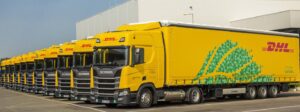
DHL Supply Chain is expanding its fleet of environmentally friendly liquefied natural gas trucks transporting car parts from the Czech Republic to Germany. The three new tractor units running on liquefied natural gas (LNG) put into operation in October 2020 will now be followed by eight more low-emissions trucks. This step will enable DHL Supply Chain to reduce CO2 emissions by 187 tonnes a year.
“Last year’s purchase of LNG-powered trucks proved very successful and at the same time aroused great interest from some of our customers in this type of ecological transport,” says Kateřina Rázlová, Director of the Automotive Division at DHL Supply Chain. “The rapid expansion of the filling station network in Germany and the Czech Republic was an important factor for the continued expansion of this alternative fuel in our fleet. It has made it possible to service a greater number of destinations with LNG and has improved route-planning flexibility.”
Eleven LNG-powered trucks from the DHL Supply Chain fleet currently transport parts for cars from the crossdock in Nepřevázka to Glauchau in the Zwickau district and to Wolfsburg, Hannover, Heilbronn, Kassel and Neckarsulm. It is becoming easier and easier to supply the expanded green fleet with this alternative fuel. There are now LNG filling stations every approx. 200 km in Germany. There are currently three available in the Czech Republic - in Louny, Klecany and Mladá Boleslav. The first of eleven trucks will cover 160 000 km per year for DHL, while the others trucks have routes with a total length of 132 000 km in their annual operating plans.
Just like in October 2020, the DHL Supply Chain fleet has seen the addition of Scania R 410 “low deck” tractor units that allow the connection of semi-trailers with three-metre internal load heights that can accommodate parts loaded into unified stacking pallets and optimized packing. Using all the cargo space available enables us to efficiently transport automotive parts using fewer trucks. This both reduces emissions and the burden on road infrastructure.
Their operating characteristics mean Scania LNG tractor units are a fully-fledged replacement for conventional diesel vehicles and far outperform them in terms of air and noise emissions. The 13-litre 6-cylinder engine running on liquefied natural gas offers a maximum output of 410 hp and a maximum torque of 2000 Nm while being far quieter. CO2 emissions are 15 percent lower.
“The use of BioLNG will enable another significant reduction in emissions,” Kateřina Rázlová adds. “The first BioLNG filling stations will open on the DHL Supply Chain truck routes in Germany as early as this year and, according to available information, the sale of BioLNG is also expected in the Czech Republic within 3 to 5 years.”
BioLNG is liquefied biomethane produced from organic waste, meaning from renewable sources. Practically no sulphur compounds are released into the air during combustion, and only a minimum of nitrogen oxides and solid particulate. The fact that running trucks on BioLNG provides a neutral CO2 emissions balance is crucial for climate protection.
The purchase of eight new LNG-powered tractor units is part of the Go Green Deutsche Post DHL environmental protection programme with the ambitious goal of zero carbon dioxide emissions by 2050. .
Source: DHL
